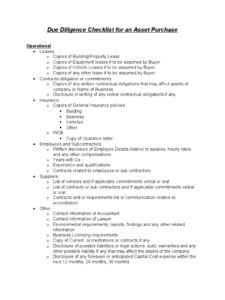Do a Due Diligence Checklist
Performing due diligence on a business is an essential step for any major investment. It gives potential investors more insight into a company’s performance and gives them a sense of the future. It also helps them avoid nasty surprises.
In many cases, a prospective buyer will use a due diligence checklist to determine if the business is worthy of a purchase. The checklist should cover several categories, including shareholder value, management, operations, and assets. The checklist will vary depending on the type of deal and may also include audited financial statements. A comprehensive due diligence checklist may contain several hundred items. If you are negotiating a merger or acquisition, you can create a customized checklist for your prospective buyer.
To prepare for a due diligence checklist, make sure that you have a clear understanding of the company’s industry and competition. Then, analyze the financial records and the financial performance of the target company. If you have an accountant, it might be a good idea to ask for at least five years of financial statements and returns.
If you’re a seller, you should be very cautious about the information you give your prospective buyer. While a buyer may have a great deal of knowledge about the company, he or she will not be able to determine everything about the company. However, a good quality CRM system can help you gather useful data for a due diligence checklist.
A typical due diligence process includes preparation, research, site visits, and documentation. It can last weeks, or even months. Depending on the length of the review period, it is possible to speed up the process.
A good CRM system will also provide reassurance to your prospective buyers that the information they’ve gathered is accurate and complete. A virtual data room will also help protect sensitive information.

How Do You Do a Due Diligence Checklist?
If you’re a prospective buyer, you should make an offer to the seller. You should be polite, but you should also be willing to negotiate an exclusivity period if you need to. This will keep the transaction stress down for the seller and help the due diligence process go smoothly.
After you accept an offer, you can begin the final stages of the due diligence process. You should be able to review the documents, such as accounts receivable and accounts payable, to verify that the seller has complied with all of his or her representations. You should also check to see if there are any environmental or antitrust liabilities. You should also check to see if the seller has a government audit in place.
The last thing you want is a deal that is delayed because the seller did not do his or her homework. When you send your digital due diligence checklist, include a list of compliance issues that you think the buyer might need to know. This will ensure that the buyer knows exactly what he or she is getting into before agreeing to the transaction.
While a due diligence checklist is a great way to ensure that you understand the company you’re acquiring, you can’t guarantee that the business will be free of problems. Often, you will find inaccuracies in the financial records of a business. You will also want to get copies of these records before you make a final decision.